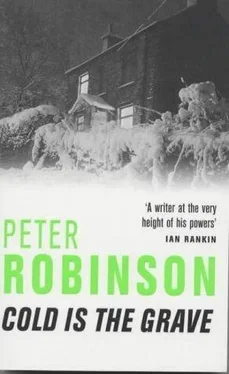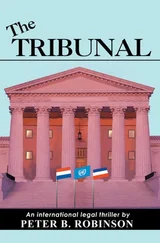Curious, Banks put down his book, walked over to the window and opened the curtains a few inches. A sporty-looking car, to judge from its shape, had pulled up in front of the cottage and a woman was getting out. He couldn’t make out her features, as it was pitch-black outside, she was wearing a scarf, and there were no street lamps on the isolated lane. He would soon find out, though, he thought, as she walked up to his front door and knocked.
When he opened it and saw Rosalind Riddle take off her scarf, he must have looked surprised enough to embarrass her.
“I’m sorry,” she said. “Have I come at a bad time?”
“No,” said Banks. “No, not at all.” He stood aside. “Come in.”
As she passed close to him in the doorway he felt her breast brush lightly against his arm, and he thought he could smell juniper berries on her breath. Gin, most likely. He took her fur coat and hung it in the cupboard by the door. Underneath, she was wearing a simple blue pastel dress, more suitable, Banks thought, for summer, than for a miserable winter’s night like this one. Still, with a mink on top, you didn’t really need anything underneath. He stopped that line of thought before it went any further.
“This is nice,” she said, standing and looking around the small room, with its blue walls and melting-Brie ceiling. Banks had hung a couple of watercolors he had picked up at auctions on the walls, and a blow-up of what he thought the best of Sandra’s photographs took pride of place over the mantelpiece. It had been taken, coincidentally, not far away from the cottage where Banks now lived alone, and it showed the view down the daleside to Helmthorpe in late evening, with a red-and-orange sunset sprawled across the sky, smoke drifting from the chimneys, the church with its square tower and odd little turret attached to one corner, the dark graveyard where sheep grazed among the lichen-stained tombstones, and crooked rows of flagstone roofs. He and Sandra might no longer be together, but that didn’t mean he rejected her talent. There wasn’t much furniture in the room, just a sofa under the window and two matching armchairs arranged at angles to the fireplace, where a couple of lumps of peat burned and cast shadows on the walls.
“Do you live here alone?” she asked.
“There’s hardly room enough for two.”
“I shouldn’t have asked. I’m sorry. Of course, I do know something of your circumstances. Your wife…”
“Cup of tea or something?”
“Or something. After a day like this one, I need something a bit stronger than tea. Gin and tonic, if you’ve got it.”
“Coming up.” Banks went into the kitchen and took the gin out of the cupboard where he kept his haphazard selection of spirits – some rum, a few ounces of vodka, half a bottle of cognac and the Laphroaig single malt, that smoky Islay, his favorite and a constant drain on his wallet.
“How strange.”
“What?” Banks turned to see that Rosalind had followed him into the kitchen. She was standing at its center with an odd expression on her face, as if she were listening to a distant voice.
“It feels… I don’t know… sort of haunted, but in a good way.”
Banks was gob-smacked. One of the reasons he had bought the house in the first place was that he had dreamed of the kitchen before he knew it existed – a dream full of warmth and feelings of extreme well-being – so that when he saw it, he knew he had to have it. Luckily the old lady who was selling didn’t want it to fall into the hands of an absentee landlord, so she let him have it for the ridiculously low price of £50,000 – a gift when you considered that there were semis and terrace cottages smaller even than this one going for £70,000 and above in some of the more popular Dales villages.
All Banks sensed about the kitchen was that there was definitely some sort of presence, that it was benevolent, and – only God knew why – that it was feminine. He didn’t really believe in gods and ghosts, had never thought much about them, being a more practical sort of man, but this was another change that had taken place since Sandra left. In the end, he accepted, even embraced, whatever the presence was, and came to believe it was some sort of spirit of the house, the way places are said to have spirits. He had read a little about the subject and named his spirit Haltia, after the Finnish, generally believed to be the spirit of the first person to lay claim to a site either by lighting a fire on it, by building a house on it, or even, in some cases, the first person to die there.
Rosalind was the first person other than Banks to feel it. Others had been there – Tracy, Brian, Sandra, Annie, Superintendent Gristhorpe, Jim Hatchley – but none of them had felt the preternatural appeal of the kitchen. Banks felt almost inclined to tell Rosalind about the dream, but he held back for some reason. He hadn’t told anyone about it yet for fear of seeming foolish or mad, and there was no point starting now.
“It’s a comfortable room to be in,” he said, pouring the drink. “You should see it when the sun’s shining through the windows. Glorious.” That was his favorite time in the kitchen, when the morning sunlight came skipping over Low Fell and sliding down the green daleside, spilling into the kitchen like honey. that wouldn’t happen again for a few more months.
“I’d like that,” said Rosalind. Then she looked away and blushed. She had dark semicircles under her eyes, Banks noticed, which made her look mysterious, tragic, even, which was hardly surprising given what she had been through this past while. Despite the poor first impression Rosalind had made on him, Banks found himself thinking that she was a woman he would like to have known, perhaps in another time, another life. Also, in another part of his mind, he suspected that she might have had something to do with her daughter’s murder.
“Ice? Lemon?”
“Just the tonic water, please.”
Banks handed her the gin and tonic and poured himself a couple of fingers of rapidly dwindling Laphroaig. They went back into the living room. The only light came from the fire and the reading lamp by his armchair. He wondered if he should turn on the overhead light and decided not to. By the look of her as she sat down wearily opposite him, Rosalind riddle looked glad of the semidarkness. He turned down the music and lit a cigarette.
“How was the get-together?”
“What you’d expect. You were fortunate you had work to keep you away.”
“I’m not good at those sorts of things. Did you get a chance at talk to Ruth and Craig?”
“A little. You know what these things are like.”
“What was your impression?”
“He seemed a nice-enough boy.”
“He probably is,” Banks said. “And Ruth?”
“I didn’t really get much chance to talk to her. I’m just glad that it’s over, that’s all.”
“Why did you want to see me? Was there something you wanted to tell me?”
“Tell you? No. What makes you think that?”
“What is it, then?”
She swirled her drink in her glass before answering. I’m worried about Jerry. He’s taking this all very badly.”
“It’s hardly surprising. I mean, after all, your only daughter is dead, murdered. He’s bound to take it badly. He’s not made of stone. And now this thing in the newspaper.”
“No, it’s more than that.”
“What do you mean?”
Rosalind sighed and stretched her legs out, crossing them at the ankles. It was a gesture that reminded Banks of Annie Cabbot.
“All his life,” Rosalind began, “the only thing that’s counted for Jerry was his work. The Job. You know what it’s like, what the demands are. The sacrifices he’s made… we’ve made…” She gave a quick shake of her head. “I’m not saying he doesn’t love us, his family, but we’ve taken the backseat all along. My career’s taken a backseat, too. We’ve always had to move where and when Jerry wanted, no matter what I was doing or how well the children were getting on at school. It’s been hard, but I accept it. I don’t mind. After all, I don’t have to stay if I don’t want to. But the rewards have made it worthwhile. I know you think he’s a social climber and maybe he is, but his origins are pretty humble. Like yours, I should imagine.”
Читать дальше












